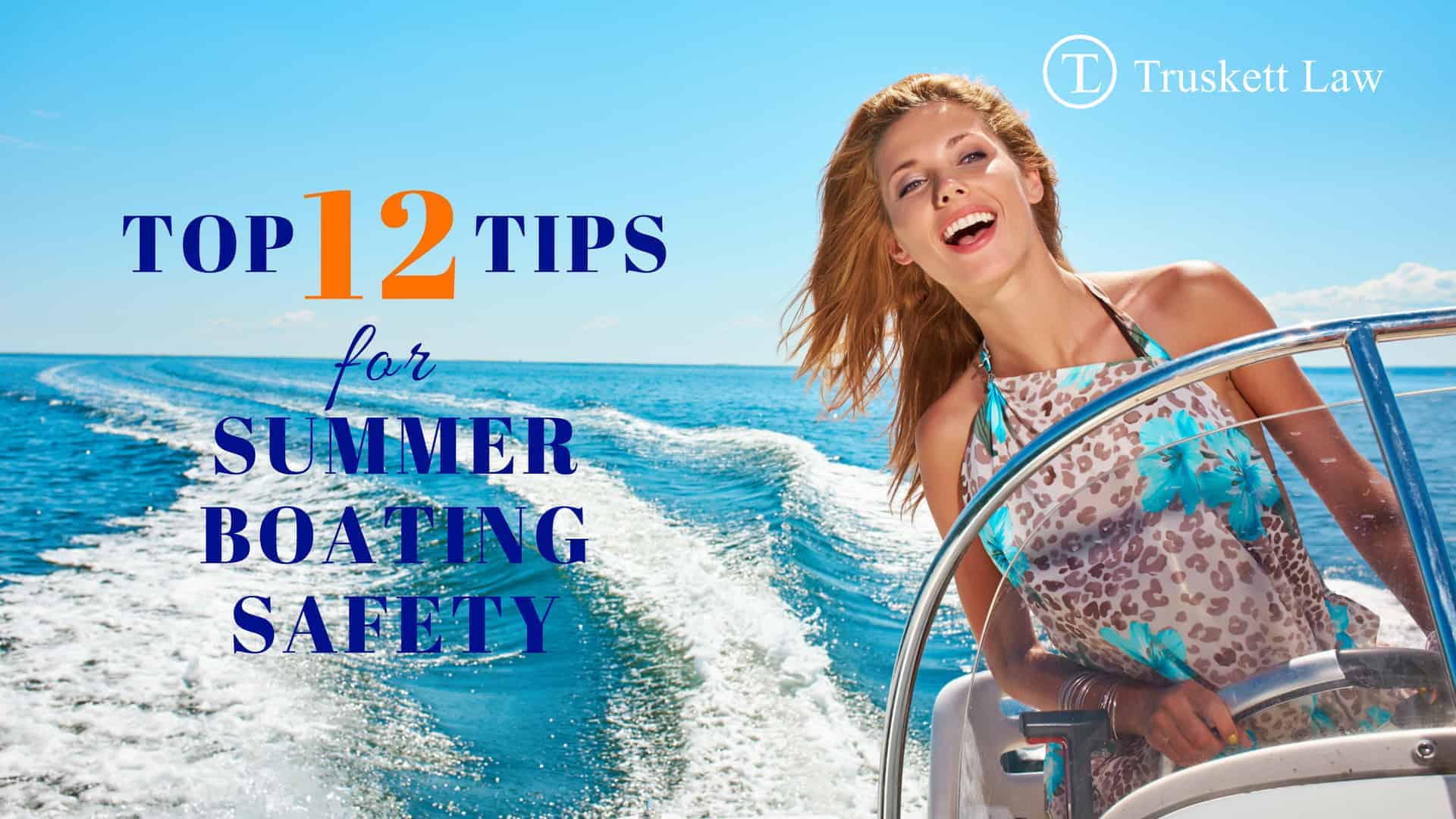
15 May Top 12 Tips for Summer Boating Safety
Image Copyright: zoomteam / 123RF Stock Photo
Summer is here
With summer vacations upon us, everyone’s going to be heading outside. And whether it’s to go swimming, fishing, skiing, or just for the sun & water, lots of summer fun takes place on a boat. At Truskett Law, one of our core values is safety. And we want you to have the most fun possible, and to stay safe while you do it. So here are our top twelve tips for summer boating safety!
1. Be Sun-Safe
Continually re-apply sunscreen on the water. Even if you use something that is supposed to be “waterproof” it’s better to be safe than sorry. And if you’ve had a boating sunburn, you kow it can be the worst kind. The wind, combined with the reflected light from white boat interiors and the reflective water, mean you’re getting hit from every direction.
2. Be Food-Safe
Did you know that picnics are a breeding ground for food poisoning? We eat warm food and don’t wash our hands. Go figure. So make sure you have plenty of hand sanitizer. And take food in a cooler. And make sure you have plenty of trash bags on board. Leaving food scraps on your boat can be an invitation for nature’s troublemakers.
3. Coast Guard Safety Checks
The US Coast Guard provides free vessel safety checks. These guys are the ultimate authority on boating safety, so take advantage of this service. If you can’t schedule a vessel check directly, they also offer virtual online safety checks.
4. Get Schooled
If you’re a beginner, this is a no-brainer. You need to get expert advice and instruction before you take your own life and safety, and that of your friends and family into your hands. But even experienced boaters need to be reminded of safety rules and tips. Truth is, most accidents are caused by experienced drivers, not beginners. Look for a course near where you boat or take this online course to help educate yourself.
5. Watch the Weather
Whether it’s a lake, river, or the ocean, water responds uniquely to weather. Never go out on a boat without a clear picture of what the weather’s going to be (or at least forecaste to be!) Things like temperature, humidity, cloud cover, wind, and even pollen counts can affect your day.
6. Boat Smart
Common sense is a powerful safety tool. Watch out for large vessels and steer clear. They don’t adjust as quickly as you do. And be aware of unsafe boaters around you. Also, obey depth warnings and speed limits even when it’s inconvenient. Those buoys are there for a reason!
7. No Lone-Ranger Skippers
One of the best ways to avoid an accident is to have an assistant skipper onboard. When you take your class, take along a partner. Or just make sure you have someone else aboard with boating knowledge. Have someone else who can drive safely in case something happens to you.
8. Make a Float Plan–and Share it!
It’s important to plan your boating expedition for several reasons including weather, traffic, and fuel. But it’s also important that someone else knows your plan. That can be a family member who’s nearby or someone at the local marina. Make sure you know where you’re going and that you’re not the only one.
A float plan can include the following information:
- name, address, and phone number of trip leader
- name and phone number of all passengers
- boat type and registration information
- trip itinerary
- types of communication and signal equipment onboard, such as an Emergency Position Indicating Radio Beacon (EPIRB) or Personal Locator Beacon (PLB)
9. Make Sure Your Passengers Can Float!
Lifejackets are the most important piece of safety equipment you have. In fact, the majority of drownings in boating accidents occur because victims do not wear lifejackets. So make sure you have plenty of jackets onboard that fit all your passengers. And wear them!
10. Drink Water on the Water
Save the alchol for later. Studies show that the effects of alcohol are exaerbated by sun and wind. So people get intoxicated much sooner than normal. This increases your risk of a deadly boating accident sigificantly. In addition, dehydration is common on the water, so drink water on the boat. Go have a beer later.
11. Swimmers Only!
One of the most dangerous things you can do is get on a boat when you can’t swim. Of course, young children with proper floatation devices and swimmer parents are fine. But make sure everyone else onboard is a competent swimmer.
12. Follow a Pre-Departure Checklist
Truth is, there’s a lot to going out on a boat. Taking your friends and family out can be lots of fun. But to be safe, you must be prepared. So follow a pre-departure checklist. This will make sure you don’t overlook any important safety precautions.
Your Safety Law Firm
At Truskett, we are committed to safety. And we are committed to accountability. If you’ve been in an accident that wasn’t your fault, please call us immediately. We will listen to you and help you know how to proceed. You may have a legitimate suit, and if you call us now, we will fight for you. Remember, your call and consultation are always free and confidential.


Sorry, the comment form is closed at this time.